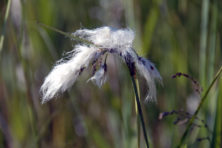Catching Wind in Carlsville
- Share
- Tweet
- Pin
- Share
When the rising cost of mortgage and utilities was making it tough to meet her bottom line in 2008, innkeeper Sandy Chlubna stepped off the grid in her search for a solution.
Chlubna had opened the Feathered Star Bed and Breakfast, named for a quilt pattern she loves, in 2000. In 2008, she had a site analysis done that showed that a move to wind power was doable, so she began slogging through the legwork to get a windmill approved and built at her property on Highway 42, just north of Carlsville.
The 110-foot metal tower topped with three 25-foot blades – 34 feet lower than the maximum allowed – was finally erected in February. The windmill was originally used in California, then reconstructed in Iowa. She received grants to help pay for it from Wisconsin Public Service’s Focus on Energy program, and from the U.S. Department of Agriculture. Though a taller tower would have provided more power because wind speed increases at higher altitudes, the cost and additional permits required were prohibitive.
Nonetheless, the windmill installation drew immediate protests from two neighbors, who objected for aesthetic reasons and a fear that their property values would go down. But many other people have congratulated Chlubna for her leadership in energy conservation and the fact that a windmill harkens back to the old days in Door County, when every farmstead had one.
The windmill produces an average of 3,000 kilowatts per month. Often, this is more than used by the bed and breakfast, and the extra power is sold to Wisconsin Public Service (WPS). If the Feathered Star needs more electricity than the windmill can produce, Chlubna buys from the grid. The simple payback time for the cost of the windmill is estimated at 15 years, but this doesn’t take into account payments received from WPS or the assumption that utility rates will increase, meaning a greater savings for those who produce their own electricity.
In March 2009, Chlubna switched from gas to geothermal heating and cooling. She also uses energy-efficient light bulbs throughout the bed and breakfast, searching especially hard for the difficult-to-find ones that produce an ambiance more like natural daylight.
Even before moving to the forefront of green energy, Chlubna had established her inn as break from the normal destination. The idea for the Feathered Star grew out of many conversations Chlubna had with her occupational therapy patients, who said their ability to vacation had been curtailed by the lack of accessibility or by the fact that places where they vacationed in Door County as couples did not allow families with children or pets. The B&Bs six rooms meet all these criteria. (The record for pets so far is nine dogs in one room, although Chlubna is quick to point out that eight of them were a new litter of pups.)
Although she follows many of the recommendations of the Travel Green Wisconsin program, like not laundering guests’ towels daily unless they request it, she has not applied for Travel Green certification. She said it requires information about water and sewage that she does not have available from her well and mound system.
You can find out more about the Feathered Star at http://www.featheredstar.com or just check out the windmill at work as you drive down Highway 42 in Carlsville.

